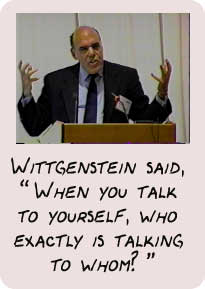|
|
Katalina Groh, Larry Prusak: Some of the world's leading thinkers |
| Storytelling in Organizations: Larry Prusak |
 |
II.I.
Stories about oneself
Participant: I am curious about another category of story, and those would be the stories I tell myself about me. Larry Prusak: Thatís a great category. Wittgenstein, the great philosopher, once said, ďWhen you talk to yourself, who exactly is talking to whom?Ē (Laughter) I think thatís a wonderful category. Presenting oneís identity, presenting oneís work identity, is really important. Again, thereís a lot of sociology about this. Participant: I am curious about another category of story, and those would be the stories I tell myself about me. |
| Larry Prusak: Thatís a great
category. Wittgenstein, the great philosopher, once said, ďWhen you talk
to yourself, who exactly is talking to whom?Ē (Laughter) I think
thatís a wonderful category. Presenting oneís identity, presenting oneís
work identity, is really important. Again, thereís a lot of sociology about
this.
Participant: And also, not just presenting it, consolidating it. What kinds of myths do I tell myself about myself, in terms of what I have to live up to, or live down, or whatever? Iím particularly interested in this, myself and a number of other colleagues, because we are trying to bring storytelling into the workplace, and we want that to originate within the individual. So Iím just curious about this internal dynamic. Larry Prusak: Thatís very interesting. I think that most people act and then tell stories about their actions. I think itís existential. You donít construct a narrative and then act. You do things and then retrospectively make sense of it and present it that way. Thatís probably more common. But thatís a very interesting point. Another participant: Just expanding on that theme, thereís a literature on the psychology of memory, and the theory that you construct your identity with your memories, and you change and edit your memories as you grow and mature and are exposed to different experiences, Larry Prusak: You know itís interesting, as we are talking. I see that there are two different intellectual streams that are going on here. · Those who are more interested in individuals and psychology.I probably fall into the latter group, just from my own training and inclination. Not that one is better than the other. And no one yet, and this is the great issue in social science, has made the micro-macro link that effective. What exactly are the ties between the economy and the social norms, to individual psychology? Itís never been done to universal satisfaction. But itís interesting hearing different streams of thinking about it. |
| Books and videos on storytelling *** In Good Company : How Social Capital Makes Organizations Work by Don Cohen, Laurence Prusak (February 2001) Harvard Business School Press *** The Social Life of Information, by John Seely Brown, Paul Duguid (February 2000) Harvard Business School Press *** The Springboard : How Storytelling Ignites Action in Knowledge-Era Organizations by Stephen Denning (October 2000) Butterworth-Heinemann *** The Art of Possibility, a video with Ben and Ros Zander : Groh Publications (February 2001) |
| The views expressed on this website are those of the authors, and not necessarily those of any person or organization |
| Site optimized in 800x600: webmaster CR WEB CONSULTING |
|
|
|
|